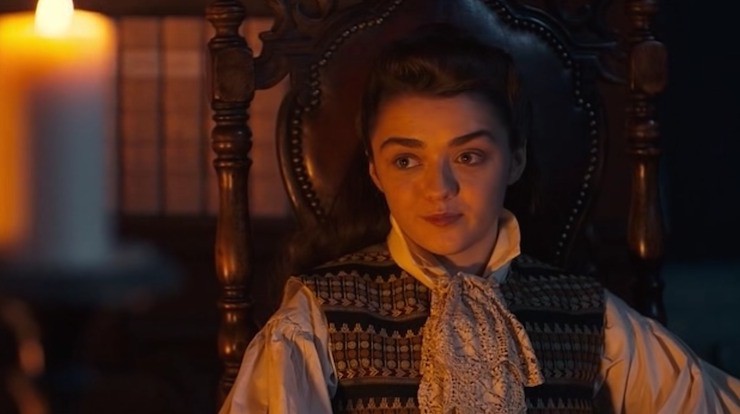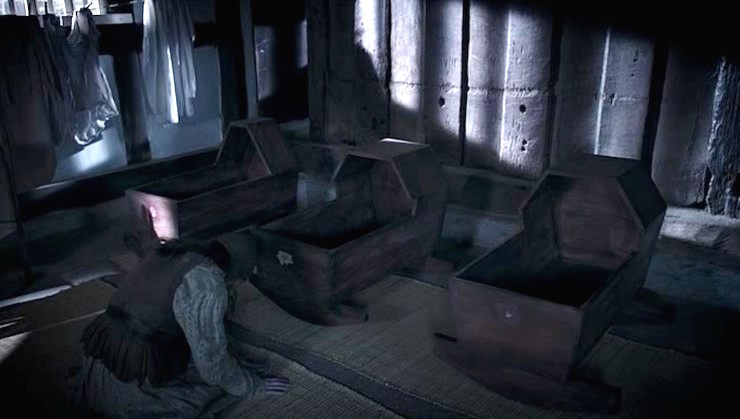What ever happened to young Ashildr, cursed with immortality? The Doctor gets to find out sooner than he probably imagined he would in “The Woman Who Lived.”
Summary
Two nobles are in the process of being robbed by “The Knightmare” when the Doctor shows up on a trip sans Clara. He has a little machine that is searching out alien tech, but before he can get his hands on the boot of the nobles’ carriage, they ride off. The Doctor finds out that the Knightmare is Ashildr (Maisie Williams), only she does not like that name anymore. She calls herself Me, and can barely remember her little Viking village with all those people she adored. The Doctor realizes that the years have made Ashildr cold and unfeeling, and he’s determined to do something about it. Ashildr asks him to take her along on the TARDIS, and he refuses. She takes him to her isolated manor, showing him her collection of journals that chronicle her life. She needs them to remember everything that’s happened, but she tears out most of the pages with truly horrible memories. (Though she leaves the pages where she chronicled the loss of her children to the Black Death as a reminder not to have any more.) The Doctor asks her why she never used the Mire chip he left her to create a companion for herself—she insists that no one is good enough.
It turns out that the thing that Doctor is seeking is something that Ashildr is also after, and they rob the nobles at home late at night to get their hands on it. The amulet turns out to be something that the Doctor calls “The Eyes of Hades.” On their way back, they run into a bandit named Sam Swift, who tries to get the drop on them. Ashildr prevents it, but almost decides to kill Swift, only going back on the choice when the Doctor tells her that she’ll make an enemy of him if she does. Back at the manor, Ashildr confirms that she knows what the amulet is for because she has a second partner in secret: an alien named Leandro, who is going to use the amulet to create a portal, so they can both leave the planet. There’s only one problem—you have to kill someone to activate it. She is planning to use her devoted servant, when two law men show up to tell “Lady Me” that the Knightmare has been spotted in her area. She leaves the Doctor in their custody, and he bribes his way out of their care.
In the town square, Sam Swift has been captured, and is about to be hanged. He starts making jokes with the audience of peasants to prolong his life, but Ashildr arrives with Leandro and calls out for his hanging. She pays to have the whole thing move along, but the Doctor arrives and continues to joke with Swift. Finally, Ashildr takes matters into her own hands and kills Swift with the The Eyes of Hades… but rather than open a portal to another world, it merely opens a portal for Leandro’s people to bring a fighter spaceship through and attack Earth. Ashildr sees the people scattering for their lives and remembers how to care again, asking the Doctor what she can do. The only way to close the portal is to reverse Sam Swift’s death, so she uses the Mire chip to bring him back. It works and stops Leandro’s people.
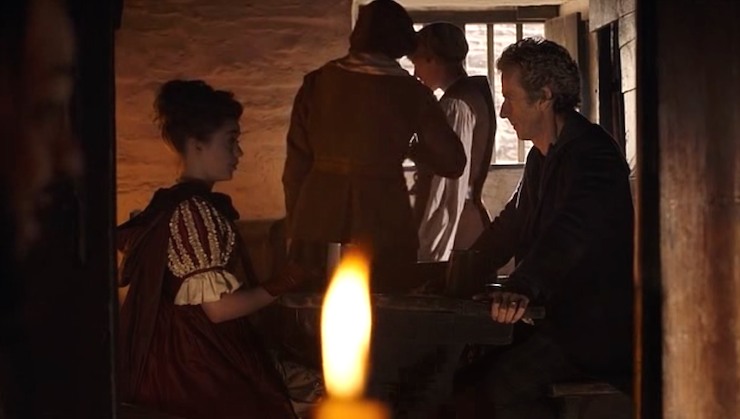
The Doctor explains to Ashildr that Swift will not be immortal like her, given how much energy was needed from him to close the portal. He also explains the reason why he cannot take her with him: they are far too much alike and wouldn’t be good for each other. Ashildr decides that there’s a better path for her—she will be the woman who protects the Earth from the Doctor and deals with the fallout of his actions. The Doctor asks if they’re enemies, but she insists that they are friends. He tells her he is very glad to have met her. Then the Doctor heads back to present day and picks up Clara. She shows him a selfie from a student he helped on her phone… and in the background of the picture, the Doctor sees Ashildr, staring and smiling.
Commentary
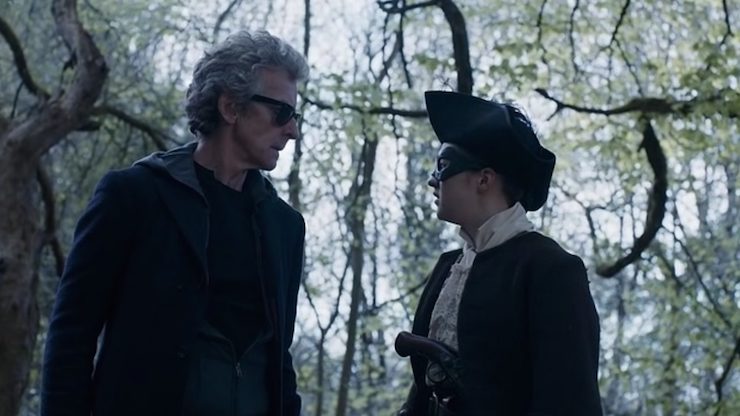
While the previous season saw Clara taking up the Doctor’s mantle on more than one occasion, there are very few characters who have the ability to take on the Doctor’s perspective in addition to his duties. Ashildr’s journey is meant to show us exactly that, and does the job in a beautifully understated way. What she does quite literally are things that we must assume the Doctor does figuratively. Sure, he has a diary, but it doesn’t have nearly enough pages to house the entirety of his life. So he must have something of a mental equivalent to Ashildr’s library of journals… and I’m willing to bet that he has quite a few pages that he’s torn out, too. The really painful things that he keeps locked away, just the same. The moment Ashildr realizes that she cares again, and how awful it makes everything, this is a struggle the Doctor faces every single day. Companions like Clara aren’t there to force him to care, they’re there to care for him so that he doesn’t have to constantly rebuild himself from scratch every time he gets a little too invested. And this seems particularly true where the Twelfth Doctor is concerned.
The episode is tantalizing for all the bits and pieces that we never get to see, and also for a very human window into what being the Doctor must be like. The character isn’t often cruel, but he can be callous, forgetful, and distant. Listening to Lady Me’s story reminds us that the Doctor probably uses these tactics as a barrier between himself and all the emotions that come from living far too long and losing everyone along the way. Ashildr’s decision at the end to look after those the Doctor leaves behind, to be there for Earth’s best interests, now begs so many questions in the fandom: Just how many companions has she influenced after the fact? What responsibilities has she taken on for the good of us all, and is she really the right person to do it?
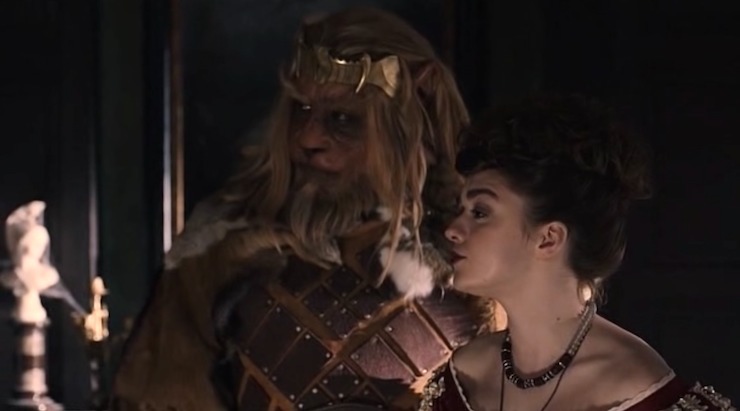
The choice of the name “Me” is entirely fitting when dealing with the similarities between Ashildr and the Doctor; in effect, the Doctor’s name is a very similar statement, a testament to what he is, rather than who. Her choice to save Swift is a similar parallel—sadly, she can no longer find herself a companion, but undoing the damage she to him, she has essentially gone through the same arc the Doctor did in the last episode. She “saved someone.”
The downsides here are very similar to previous episode’s issues—much of what goes on is entirely a setup for the very end of the episode, a build to Ashildr finding her humanity again, but what comes between doesn’t seem important enough. That little heist, for instance, seems a great deal of fuss, when it could have easily been a quick there-and-back scenario. While there’s a lot of emotion packed into the script, Ashildr spends so much of her time denying all of it, we miss out the opportunities to see those moments land for her. (It makes the flashbacks with her empty cribs one of the strongest points of the episode because we are given the chance to really see how it affects her.)
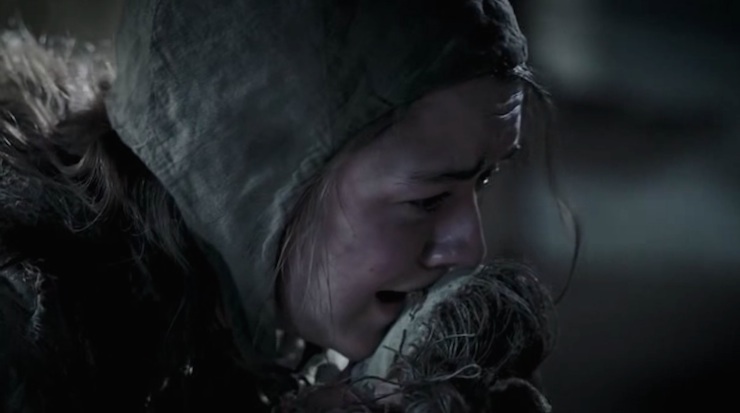
The climax of this episode is just tops. Dealing with the historically crowd-pleasing theatre of public execution gives the episode a heavy dose of humor, even as it addresses a very dark aspect of the past. Swift’s way with the audience is charming, and the Doctor’s ability to play along is such smart way to allow him to play hero in this story. I would have watched a full half hour of that.
Maisie Williams does it again, being such a superb foil to the Doctor that we don’t miss Clara overmuch in this episode. This is also, markedly, the first episode of Who written by a woman since Helen Raynor’s Sontaran two-parter back in season four. Catherine Tregenna wrote for Whovian spinoff Torchwood, and did an excellent job here with the material given. Hopefully, she’ll be back for another round. The potential arc that the end of the episode plays into is chilling; we know we’ll be seeing Ashildr (or Me or whatever she’s calling herself at that point) again, but how this will all pan out by the season finale makes for great suspense. I haven’t been this excited to find out what lies in wait since Rose kept blinking in and out of episodes in season four.
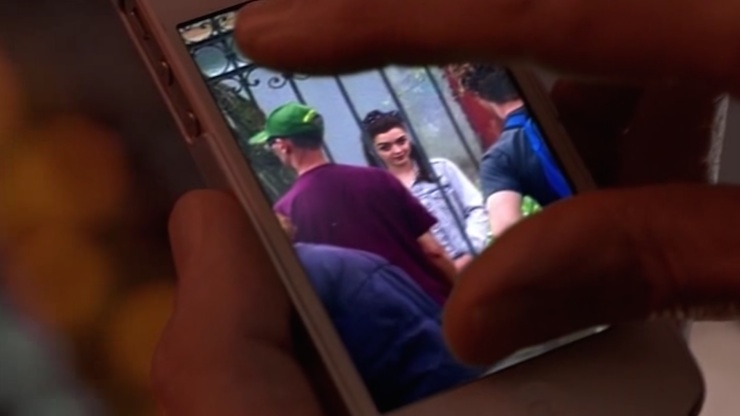
I’m at a bit of a loss to understand why the Doctor wouldn’t tell Clara about what went down by the end; it is extremely relevant for her, even knowing that the Doctor himself is never much of a sharer. And she really needs to stop saying things like “I’m not going anywhere,” because whether or not she dies, it’s just a little too heavy-handed when all is said and done. Stop being ominous, Clara.
Here are the few shout-outs that I noticed in this episode:
- Lady Me’s butler, Clayton, is also the gentleman who voiced the Face of Boe on the show.
- Speaking of the Face of Boe, the Doctor suggests that Ashildr might run into Captain Jack Harkness at some point. To which I say, Jack’s reappearance on the show is well past due.
- The Doctor also mentions the Great Fire of London, and tells Ashildr that it was started by the Terileptils, which happens in the Fifth Doctor serial, “The Visitation.”
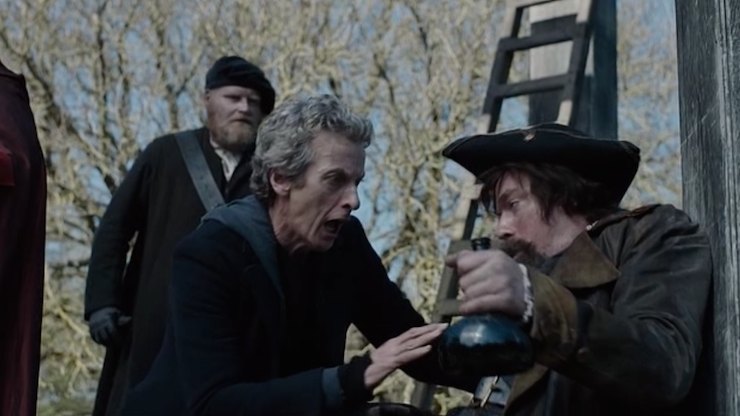
- The Doctor says that purple is the color of death, which might play into the idea that the galactic color for an emergency vehicle is mauve (according to the Doctor in “The Empty Child”)—they are quite close on the color spectrum. In addition, the color of “immortality” is a bright yellow-gold… unsurprisingly, the same color as regeneration energy.
Emmet Asher-Perrin thinks she should get a special prize for getting through this whole thing without making a “Lion King” joke about Leandro. You can bug her on Twitter and Tumblr, and read more of her work here and elsewhere.










